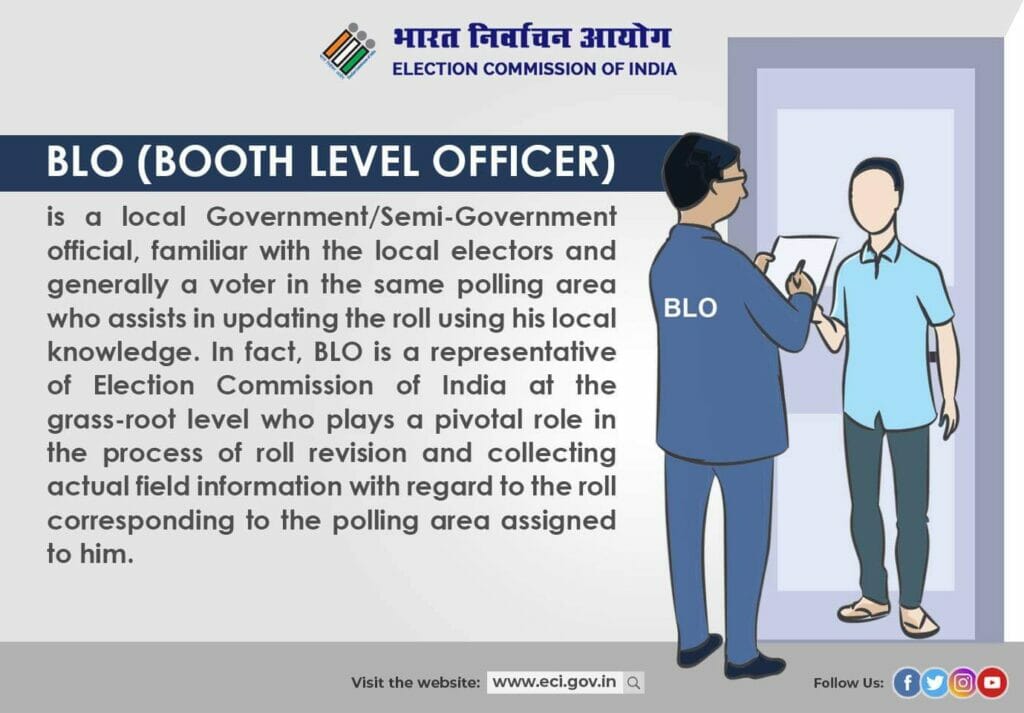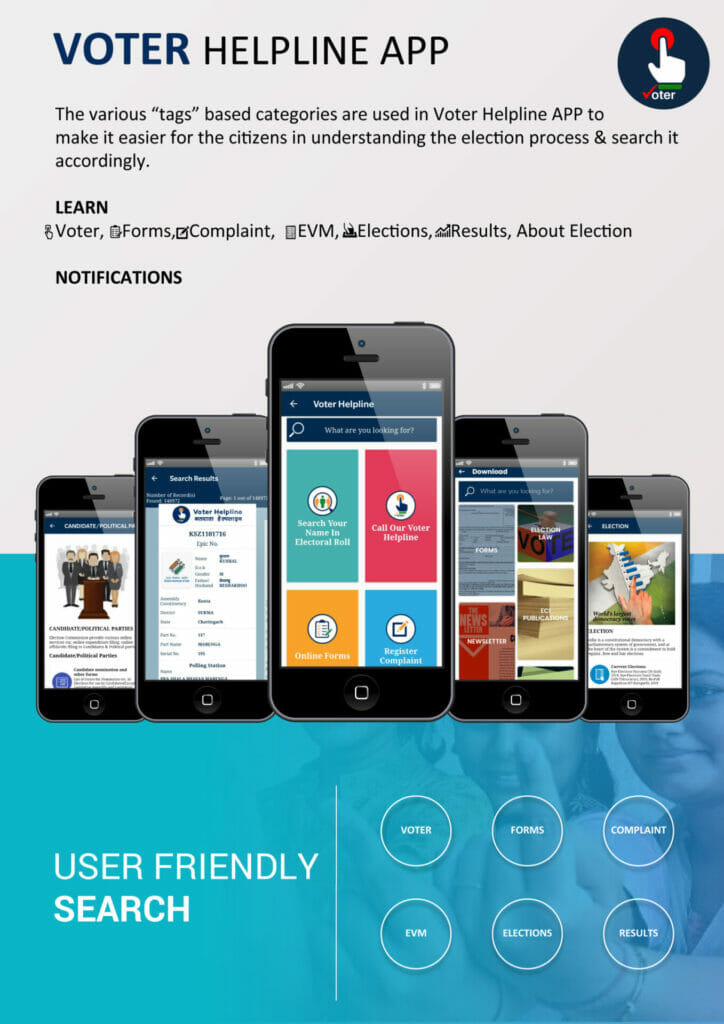As the 2023 Karnataka Assembly Elections approach, thousands of booth level officers (BLOs), across the state, are going door to door, draft list in hand, to check the accuracy of electoral rolls. BLOs are government, semi-government or retired government employees, who check that electoral rolls are accurate and up to date at the level of a polling booth (also called part).
This is the third and final part of a series looking deeper into the implications of the Bengaluru voter data theft controversy.
Part I: Illegal voter data collection: Does it really matter?
Part II: Illegal voter data collection: How can we protect our privacy?
Part III: Frontline workers of election management (this article)
It is by impersonating these BLOs that Chilume workers were able to collect voter data illegally, according to reports by The News Minute and Pratidhvani. As is evident from their work, BLOs are at the frontlines of election management in the country and it is important to understand how these workers are faring as the city is embroiled in electoral controversy.
The Election Commission of India (ECI) guidelines suggest that BLOs should be familiar with the voters in their polling booth and ideally be a resident of the same area, so that they can easily do voter verification work. Indeed, the ECI suggests that BLOs should be “like a friend, philosopher and guide of the local people in matters relating to the roll.” While placing this heavy responsibility on BLOs, it appears that the ECI provides little support to these grassroots level workers.
In 2016, researchers from Janaagraha noted several systemic problems in the functioning of BLOs in Bengaluru and we found that most of these problems continue six years on.

Because BLOs are supposed to be the direct link between the ECI and citizens, it is crucial that citizens are able to contact them easily for help adding, deleting or changing names in voter rolls. In fact, voters of a Shivajinagar part were able to report potential voter data theft, because of their familiarity with their local BLO.
However, there is a clear lack of coordination between the Chief Election Officer-Karnataka (CEO) and the BBMP in this regard. Lists of BLOs, their supervisors, and the Election Registration Officers (ERO) published by the CEO-Karnataka’s website did not match the latest lists published by the BBMP. The CEO’s list appeared to be outdated. The BBMP’s lists of BLOs and other election personnel were more accurate, though there still appeared to be mistakes, particularly in the details of the EROs.
Overburdened workers
The Janaagraha report noted that the majority of the BLOs in Bengaluru in 2016 were teachers and this seems to be case even today. Most BLOs were government and Aanganwadi teachers. The recruitment of school teachers for election duty has sparked concerns about impact on education, particularly of children from marginalised groups several times, but the ECI appears unmoved and has said that teachers would have to finish their school work and then work on voter lists.
We contacted over twenty teachers, who were deputed as BLOs in various constituencies in the city and all of them stated that they conducted door to door verification during teaching hours after marking attendance in their place of work.
Sowmya, a primary school teacher and BLO from a Bengaluru North constituency, laughs at the possibility of working evenings after a full day of school work. The first time the BLO started her work was around December 8th. She points out that she has to check 300-400 houses to cover by December 24 or 25th. “How can we finish if we work only evenings?” she asks.
Most BLOs we spoke to said that they were let off their regular duties, but some had to face the ire of their supervisors at their regular jobs. Raghu (name changed) a BESCOM worker from Marathahalli, was told by his supervisor that he would have to finish his regular work and do election duty after work. “BBMP tells us we have to report for election duty, but they should also manage our supervisors. How can we work both jobs for so little money?” Raghu’s supervisor eventually managed to have him excused from his BLO duties, but it is not clear if anyone new has been appointed to take his place.
Read more: How to fix voter registration issues in Bengaluru
Meanwhile, in several other wards, a single BLO has to manage two booths or parts. Experienced BLOs felt that working two parts was not too difficult, particularly if they were close to one another.
Amuda S, an Aanganwadi teacher from Jalahalli, has been a BLO for 20 years. “I am very familiar with the area and know many people. It is a little time consuming, but I can manage two parts,” says Amuda, who has already finished voter verification work in one of her parts. But Jayamma from Shivajinagar who is doing BLO work for the first time is overwhelmed by the two parts she has been assigned. “It is difficult to find all the houses. At first especially I didn’t know where to start.”
Some of Jayamma’s colleagues in the same ward appeared to realise they had been assigned two parts for the first time from this reporter. A teacher who didn’t want to be named said she would have to check with her supervisor, as she hadn’t been informed about having to do voter verification in two parts.
We found that in Bengaluru South Assembly Constituency covering areas like Bannerghatta, at least 60 BLOs worked two parts. Rakesh, a bill collector, from this constituency said he tried to manage the work by minimising house visits and calling voters to come submit documents at his workplace. A first time BLO, he was also unsure what the honorarium amount would be.
Poor remuneration
This lack of communication appears to be a common thread in BLO recruitment. Most first time BLOs recruits told us that they had not been told anything about payment for this work. BLOs are currently paid Rs 7,000 per annum for election duties, but this information was not always conveyed verbally or in writing.
Two new recruits, one from Rajajinagar and another from Anekal, said they were not aware that they would be paid at all. However, long term BLOs like Amudha said they received all payments due to them. All BLOs we spoke to unanimously agreed that the honorarium was inadequate considering the amount of work they had to do.
Muniratnamma, a BLO in the Whitefield area, has been asked to verify the names of over 900 people in her part. She began door to door verification 15 days ago and has been told to finish by December 25th. She points out that BLOs not only have to work intensively during election period, but are expected to maintain and update voter lists throughout the year. “We have to do two jobs and the honorarium is not even a month’s salary,” she remarks.
The ECI also does not cover any other costs borne by BLOs during the course of their duty, such as food or travel costs. “They say all BLOs live in the part they are working in and they can just walk everywhere. But this does not happen in reality,” says a BLO supervisor from Shivajinagar, who did not wish to be named.
Many BLOs we spoke to were familiar with their parts because they worked in those neighbourhoods, as teachers, BESCOM workers, link workers or health workers. Most travelled from across the city to their part.
Shamala, a government school teacher who has worked as a BLO since 2016, says she has to travel at least an hour to reach Shivajinagar, where her assigned polling booth is located. “I have to catch four to five buses a day to get to and from work, which is already tough, but with door to door verification I sometimes have to take autos at least half way because it gets late in the night or starts raining. Just travel and some tea or meals will eat up most of this honorarium,” she points out. Moreover, BLOs who manage two parts do not get double the honorarium amount but only a small increment, according to the ECI guidelines.
Inadequate support
The difficulties do not end there. The Janaagraha report pointed out that during the verification process BLOs struggled to locate house numbers provided in the voter rolls, found voters unavailable during work hours leading to repeated visits, and faced language difficulties with migrants.
Voters also routinely refused to cooperate with BLOs as they were concerned about providing personal information. Six years on, most BLOs reported the same problems in the field and there appears to be no clear system to help deal with these issues. The ECI introduced several software to make voter management easy including BLO-NET, an app centralised platform that allows BLOs to download voter rolls onto their phone, and verify details and add documents given by voters and the Garuda app.
While three BLOs we spoke to said they used the Garuda app, most were only trained to process voter data by paper and were not familiar with the app. Ironically, while private entities received BLO identity cards illegally, several legitimate newly recruited BLOs have not yet received one. “I show people my BESCOM identity card. If they are not satisfied, I give them my (BLO) supervisor’s number. But sometimes residents are not satisfied with that,” says Abhi, a meter reader from Marathahalli, who has been assigned a booth in Whitefield. “If they had at least assigned me to Marathahalli where I visit houses already, it would have been easier,” he adds.

In other parts of the city, newly recruited BLOs are only hearing of their appointment this week though the BBMP’s lists appear to have been prepared as early as November 30th.
In Jalahalli, BESCOM workers Chandraiah and Boodesh learnt of their recruitment and attended their first training session only around December 17th or 18th. They are not sure when they will start work, what they will have to do, and how they can complete voter verification work by the end of the month.
Despite all these issues, most BLOs we spoke to said they felt as government workers they could not avoid the responsibility. Some, like Shamala who has recently retired, hope that they can be excused from these duties next year, while others like Abhi, from Whitefield, say they have requested a better honorarium for their troubles.